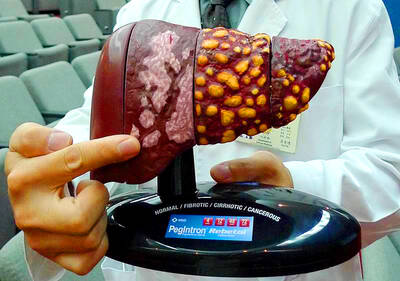China has drafted three new policy guidelines for cross-Taiwan Strait engagements in the wake of the Jan. 14 presidential and legislative elections, according to a local media report.
One of the new strategies involves Beijing expanding its outreach to Taiwanese with different party affiliations and from all walks of life, as well as an effort to exert more influence over the Taiwanese news media and help China-based Taiwanese companies upgrade operations and resolve trade disputes, the Chinese-language United Daily News said.
Chinese officials in charge of cross-strait affairs have held several brainstorming sessions since President Ma Ying-jeou (馬英九) of the Chinese Nationalist Party (KMT) was re-elected to a second four-year term last month, a source familiar with the matter said earlier this week.
In addition to charting three new policy guidelines, Chinese officials have also begun to execute decisions reached at those meetings, the source said.
The visit of Association for Relations Across the Taiwan Straits Deputy Chairman Zheng Lizhong (鄭立中), Beijing’s No. 2 cross-strait negotiator, which concluded on Thursday, was part of China’s new approach, the source said.
During his visit, Zheng, who is also deputy director of China’s Taiwan Affairs Office, traveled extensively in southern Taiwan, a DPP stronghold. While there he met with local farmers and aquaculture operators in an effort to forge relationships. According to the source, Zheng even stayed overnight at the homes of milkfish growers in Greater Tainan.
He also reached an agreement with Tainan milkfish farmers to form a joint venture company to handle fish farming in Taiwan and the sale of the fish in China, the source said.
Prior to his departure on Thursday, Zheng said his visit had been very fruitful, but he did not elaborate.
Other sources said that China’s new cross-strait action plan includes inviting Taiwanese to engage in “long stay” visits in China’s first-tier cities, living with selected Chinese families in an attempt to forge grassroots friendships.
The Chinese authorities will also continue to encourage Taiwanese to study and work in China.
In addition, the sources said that Beijing was not ruling out engaging with Democratic Progressive Party (DPP) figures or other pro-independence supporters.
Political and military issues could also be placed on the agenda of future cross-strait talks, the sources said.
Most interesting is the suggestion that China has decided to enhance its direct and indirect influence on the news media in Taiwan, the sources said, adding that the decision is based on Beijing’s belief that the reporting of local media outlets have helped convince many Taiwanese to support the so-called “1992 consensus” for cross-strait cooperation.
The KMT defines the “1992 consensus” as an agreement according to which it interprets “one China” as the Republic of China (ROC) on Taiwan, while Beijing defines it as the People’s Republic of China. The DPP says the “1992 consensus” does not exist.

The Taipei Summer Festival is to begin tomorrow at Dadaocheng Wharf (大稻埕), featuring four themed firework shows and five live music performances throughout the month, the Taipei Department of Information and Tourism said today. The festival in the city’s Datong District (大同) is to run until Aug. 30, holding firework displays on Wednesdays and the final Saturday of the event. The first show is scheduled for tomorrow, followed by Aug. 13, 20 and 30. To celebrate the 30th anniversary of Disney Pixar's movie Toy Story, the festival has partnered with Walt Disney Co (Taiwan) to host a special themed area on

Aftershocks from a magnitude 6.2 earthquake that struck off Yilan County at 3:45pm yesterday could reach a magnitude of 5 to 5.5, the Central Weather Administration (CWA) said. Seismological Center technical officer Chiu Chun-ta (邱俊達) told a news conference that the epicenter of the temblor was more than 100km from Taiwan. Although predicted to measure between magnitude 5 and 5.5, the aftershocks would reach an intensity of 1 on Taiwan’s 7-tier scale, which gauges the actual effect of an earthquake, he said. The earthquake lasted longer in Taipei because the city is in a basin, he said. The quake’s epicenter was about 128.9km east-southeast

BE CAREFUL: The virus rarely causes severe illness or death, but newborns, older people and those with medical conditions are at risk of more severe illness As more than 7,000 cases of chikungunya fever have been reported in China’s Guangdong Province this year, including 2,892 new cases last week, the Centers for Disease Control (CDC) yesterday said it is monitoring the situation and considering raising the travel notice level, which might be announced today. The CDC issued a level 1 travel notice, or “watch,” for Guangdong Province on July 22, citing an outbreak in Foshan, a manufacturing hub in the south of the province, that was reported early last month. Between July 27 and Saturday, the province reported 2,892 new cases of chikungunya, reaching a total of 7,716

STAY VIGILANT: People should reduce the risk of chronic liver inflammation by avoiding excessive alcohol consumption, smoking and eating pickled foods, the physician said A doctor last week urged people to look for five key warning signs of acute liver failure after popular producer-turned-entertainer Shen Yu-lin (沈玉琳) was reportedly admitted to an intensive care unit for fulminant hepatitis. Fulminant hepatitis is the rapid and massive death of liver cells, impairing the organ’s detoxification, metabolic, protein synthesis and bile production functions, which if left untreated has a mortality rate as high as 80 percent, according to the Web site of Advancing Clinical Treatment of Liver Disease, an international organization focused on liver disease prevention and treatment. People with hepatitis B or C are at higher risk of